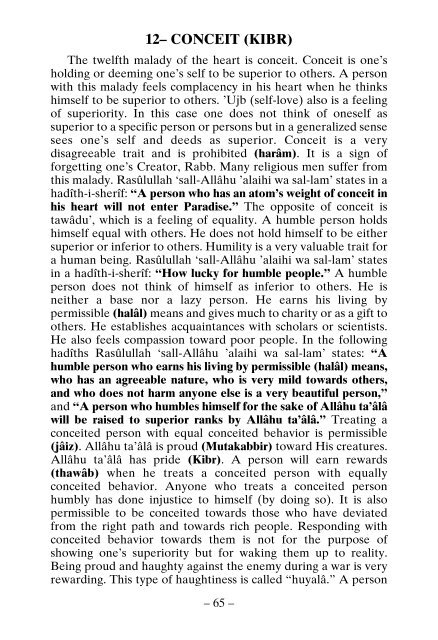Ethics of Islam
Ethics of Islam is taken from the book Berîka by Muhammad Hâdimi. Immorality and ways to get rid of it; 40 depravities and cures to them; usefulness of ethics; what is a soul; strengths of a soul; Personalities emanating from wisdom, courage, chastity and justice are extensively explained.
Ethics of Islam is taken from the book Berîka by Muhammad Hâdimi. Immorality and ways to get rid of it; 40 depravities and cures to them; usefulness of ethics; what is a soul; strengths of a soul; Personalities emanating from wisdom, courage, chastity and justice are extensively explained.
Create successful ePaper yourself
Turn your PDF publications into a flip-book with our unique Google optimized e-Paper software.
12– CONCEIT (KIBR)<br />
The twelfth malady <strong>of</strong> the heart is conceit. Conceit is one’s<br />
holding or deeming one’s self to be superior to others. A person<br />
with this malady feels complacency in his heart when he thinks<br />
himself to be superior to others. ’Ujb (self-love) also is a feeling<br />
<strong>of</strong> superiority. In this case one does not think <strong>of</strong> oneself as<br />
superior to a specific person or persons but in a generalized sense<br />
sees one’s self and deeds as superior. Conceit is a very<br />
disagreeable trait and is prohibited (harâm). It is a sign <strong>of</strong><br />
forgetting one’s Creator, Rabb. Many religious men suffer from<br />
this malady. Rasûlullah ‘sall-Allâhu ’alaihi wa sal-lam’ states in a<br />
hadîth-i-sherîf: “A person who has an atom’s weight <strong>of</strong> conceit in<br />
his heart will not enter Paradise.” The opposite <strong>of</strong> conceit is<br />
tawâdu’, which is a feeling <strong>of</strong> equality. A humble person holds<br />
himself equal with others. He does not hold himself to be either<br />
superior or inferior to others. Humility is a very valuable trait for<br />
a human being. Rasûlullah ‘sall-Allâhu ’alaihi wa sal-lam’ states<br />
in a hadîth-i-sherîf: “How lucky for humble people.” A humble<br />
person does not think <strong>of</strong> himself as inferior to others. He is<br />
neither a base nor a lazy person. He earns his living by<br />
permissible (halâl) means and gives much to charity or as a gift to<br />
others. He establishes acquaintances with scholars or scientists.<br />
He also feels compassion toward poor people. In the following<br />
hadîths Rasûlullah ‘sall-Allâhu ’alaihi wa sal-lam’ states: “A<br />
humble person who earns his living by permissible (halâl) means,<br />
who has an agreeable nature, who is very mild towards others,<br />
and who does not harm anyone else is a very beautiful person,”<br />
and “A person who humbles himself for the sake <strong>of</strong> Allâhu ta’âlâ<br />
will be raised to superior ranks by Allâhu ta’âlâ.” Treating a<br />
conceited person with equal conceited behavior is permissible<br />
(jâiz). Allâhu ta’âlâ is proud (Mutakabbir) toward His creatures.<br />
Allâhu ta’âlâ has pride (Kibr). A person will earn rewards<br />
(thawâb) when he treats a conceited person with equally<br />
conceited behavior. Anyone who treats a conceited person<br />
humbly has done injustice to himself (by doing so). It is also<br />
permissible to be conceited towards those who have deviated<br />
from the right path and towards rich people. Responding with<br />
conceited behavior towards them is not for the purpose <strong>of</strong><br />
showing one’s superiority but for waking them up to reality.<br />
Being proud and haughty against the enemy during a war is very<br />
rewarding. This type <strong>of</strong> haughtiness is called “huyalâ.” A person<br />
– 65 –

















